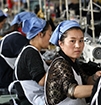Abstract
This article uses a Marxian political economy perspective to analyze the formation of the reserve army of labor in China during the reform era, which began in 1978. Following the methodology in Giovanni Arrighi’s seminal 1970 article, we seek to show that the formation of an industrial reserve army is a historical process in which the state played an active role. The Marxian historical method is empirically more relevant than the Lewis model in understanding the surplus labor question in China.



